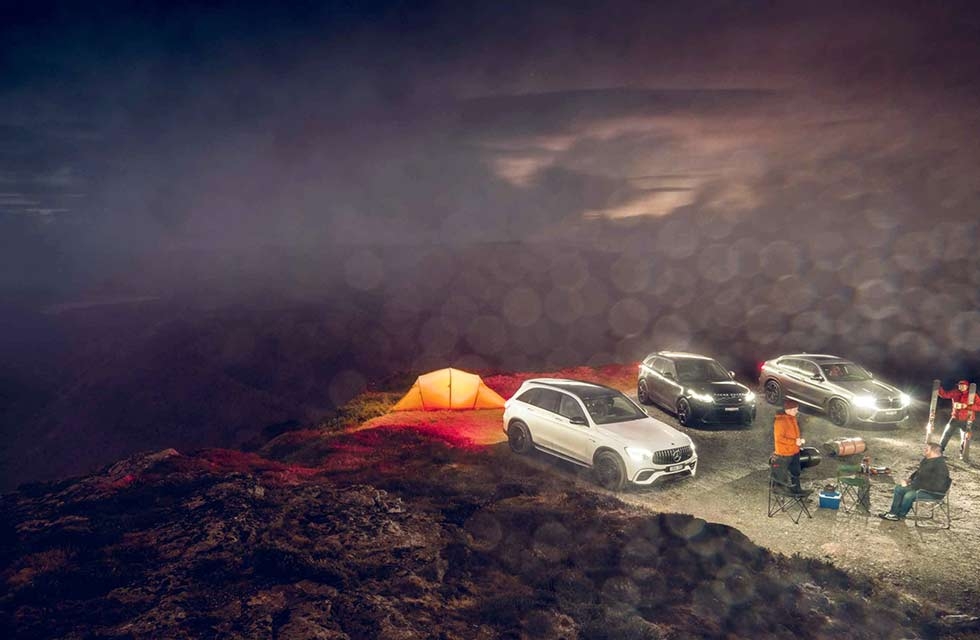
Three extravagantly overstuffed SUVs stray out of their comfort zones. Which prevails in this superpower summit?
HIGH, WIDE & HANDSOME COMPARISON / SUPER-SUVs
2020 BMW X4 M Competition F98 vs Range-Rover Velar SVA vs Mercedes-AMG GLC 63 S 4MATIC+ X253 – Which one’s the quickest SUV Wheels has ever strapped a VBOX to?
In ancient Rome, there were certain fabrics so delicate and finely stitched they were called subtilis, literally ‘underwoven’. From that term came the English word ‘subtle’, the notion of qualities understated or concealed. By and large, production cars aren’t long on subtlety. In order for a complex product to communicate its appeal, it is often the case that a certain heavy-handedness is required to hammer home the sell. Take high-performance SUVs for instance. These usually benefit a sales proposition with the delicacy of an anvil.
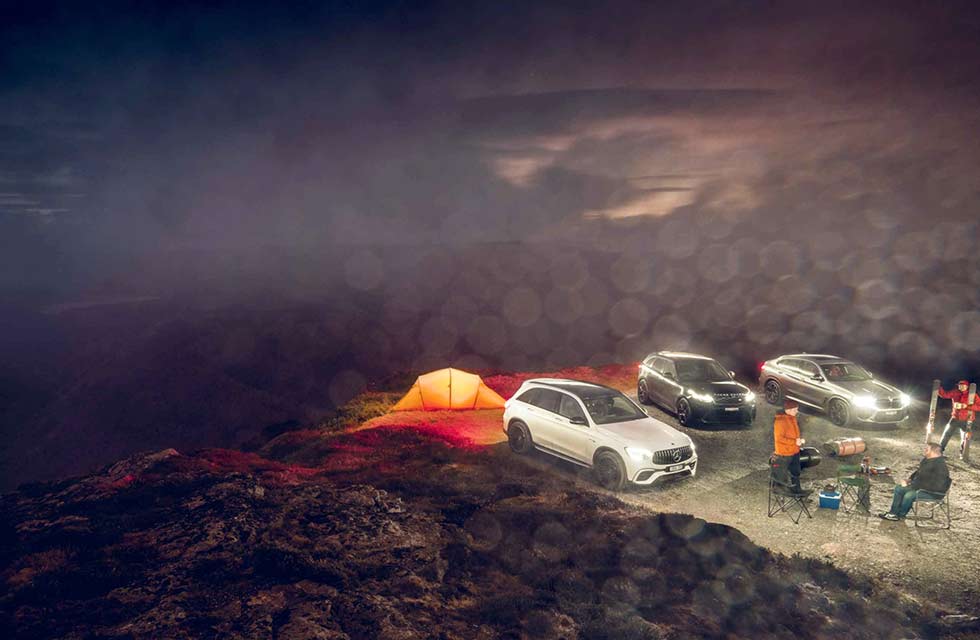
The 375kW/700Nm 2020 Mercedes-AMG GLC 63 S X253 is a case in point. It doesn’t need to be notably clever because buyers in this market sector don’t demand anything particularly nuanced. The buyer requirements for a super-SUV are, in no particular order, the ability to look hugely expensive, sound ridiculously potent, and smoke almost anything away from a stoplight. That’s about it.
The GLC does exactly what buyers in this category want. It’s a loveable brute of a thing
That the GLC X253 can do a lot more is a credit to Mercedes-AMG but largely peripheral to the point. Affalterbach has figured out the motivations of the target customer with forensic precision and hit bullseye, hence the hot GLC’s rampant popularity. We have a comparison here, but it’s no spoiler to post upfront that the Mercedes is unmatched in acing those three criteria. For quite some time, the GLC 63 was the only model in this class that shoehorned a V8 beneath its bonnet, but then the Jaguar F-Pace SVR arrived and now we have its ruggedised cousin, the Range Rover Velar SV Autobiography. This is effectively the last hurrah for the supercharged 5.0-litre bent-eight, with a 4.4-litre BMW-sourced N63 unit said to be next for JLR. Until that happens, we have 405kW/680Nm of the good stuff driving through four mud-and-snow tyres. Eek.
The third way here is represented by the 2020 BMW X4 M Competition F98. Lighter, lither and less a pair of cylinders, the straight-six S58 powerplant requires a pair of huffers to boost power up to 375kW and torque to 600Nm. This engine is set to find its way beneath the bonnet of the next M3, so we’re doubly keen to see if it’s capable of punching above its weight in this formidable company.
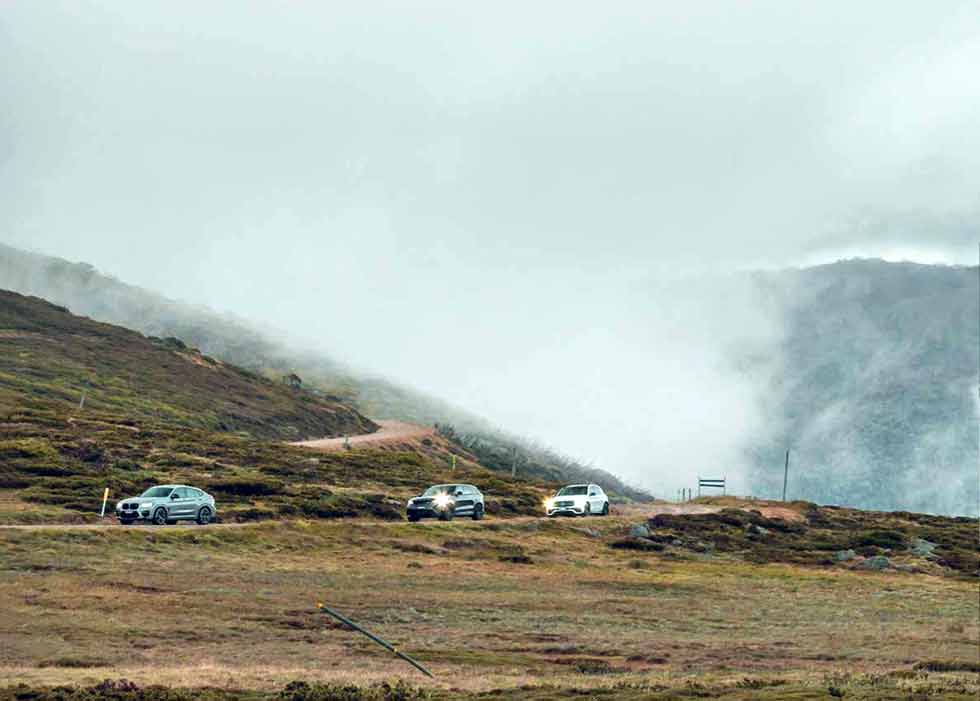
The Mercedes underscores its initial advantage by being the most affordable of the trio at $164,600 – just – before you start ticking options boxes. The BMW is priced at $164,900, while the Velar is a hefty $176,412. When forking over this sort of coin, we appreciate why buyers want to feel as if they’ve been compensated with a look and feel some way removed from the norm. The GLC’s the only one with a five-year warranty too, thanks to a recently inked upgrade to terms.
Before we get into details, it’s off to Heathcote and the brutish exercise of firing two tonnes of leather, luxe and lumbar massagers down the drag strip. Conditions are near perfect, and both the GLC and the Velar exactly match their factory claims to 62mph (100km/h) of 3.8 and 4.5 seconds respectively. The AMG breaks the beam at the 400m mark in 12.1sec three runs in a row. The Velar’s not a great deal slower at the business end of the dragway, tripping the clock with a best of 12.3sec.
The BMW claims a 0-62mph (0-100km/h) time of 4.1sec. Activate launch control, floor the throttle and, as the revs plateau, sidestep the brakes. You’ll get an unspectacular 4.4sec result. The trick is to wait. The revs will continue to climb, your teeth will probably grate at the lack of mechanical sympathy, but lift off the left-hand pedal at 4200rpm and the X4 will leap out of the blocks with a perfect chirrup of wheelspin for 3.7sec to 100km/h and a 400m time of 11.9 at 189.1km/h. It’s astonishingly potent. That 400m figure is lineball with a Porsche 911 GT3 RS 4.0 991.2, so you’d need something very serious to show it a clean pair of heels.
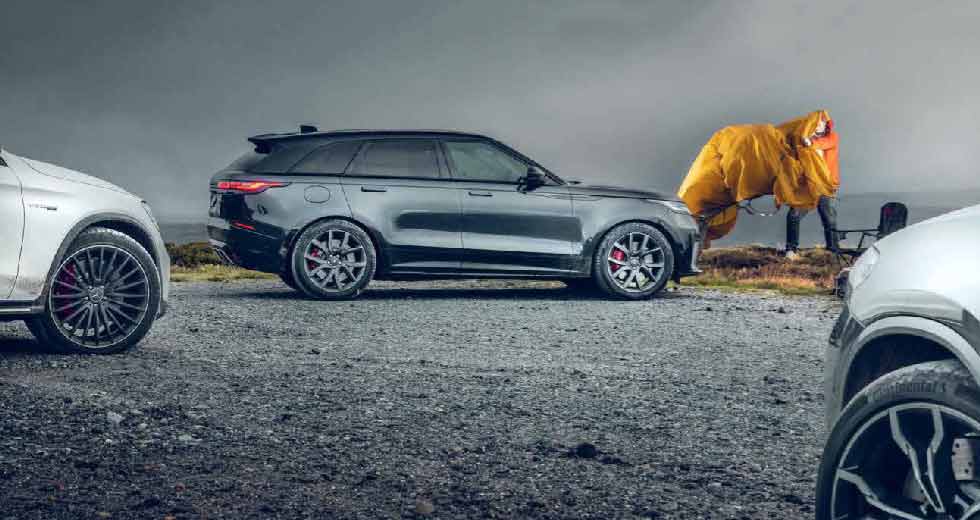
The X4 is helped by the most focused rubber of the trio. While all three feature 21-inch boots at the back, the BMW’s Conti SportContact6 tyres are a far grippier and more purposeful set of hoops than the more heavily grooved Conti CrossContact UHPs of the AMG and Pirelli Scorpion Zero mud-and-snows of the Velar. You sense that when attacking a bend, too. The BMW feels more athletic than the others. It’s also the only one of the trio on steel springs, aided here by a set of adaptive dampers that are largely redundant because the Comfort setting is all you’ll ever use. It’s firm but, given the focus of the vehicle, not unacceptably so. As well as the suspension, the throttle and steering can be switched through Comfort, Sport and Sport Plus modes, and you can save custom presets to the M1 and M2 tabs on the steering wheel.
It’s the only one of the three cars you would want to drive flicking up and down the ’box using the rubberised shift paddles, partly because of two issues: there’s little meaningful go below 2500rpm; and the eight-speed ZF torque-converter gearshift’s logic isn’t the most polished, often plugging you into too high a gear mid-corner and then clumsily downshifting just as you’re trying to scribe a clean arc post-apex. Still, it keeps you involved, and there’s a delightful howl at the top end that’s not dissimilar to that of an Alfa Romeo Stelvio Q. The Sport setting is heavily rear-biased, but gathering up a slide can feel a little clumsy, the tall body whipping back into line without too much help from the front tyres.
The brake pedal is relatively soft and benign in modulation, but the brakes held up well on a mountain descent at Falls Creek. The exhaust can be set into loud or quiet modes, but the difference isn’t hugely marked. While the car retains this setting when keyed off, it forgets the ride, throttle and steering preferences, reverting to Comfort everything.
After the agility of the BMW, the GLC 63 S feels as if it’s trying to bludgeon corners into submission. There’s little difference in kerb weight between the two Germans, but you’d swear the AMG was a couple of hundred kegs heavier. The engine is by far the most dominant of the trio, the chuntering 4.0-litre twin-turbo M177 lump unembarrassed by any halfway reasonable request for acceleration. The nine-speed ’box is therefore best left to its own devices.
Fling the AMG at a bend and it corners with astonishing flatness. That, combined with meaty steering and the feeling there’s a virtually bottomless well of torque to pull you out of trouble, engenders an initial feeling of invincibility. There is, however, an element of artifice to it, the GLC’s dynamic engine mounts helping this all-of-a-piece impression. Push harder, into the realm where the BMW feels at its happiest, and the GLC’s stability control starts grabbing noisily at an outside front brake disc and the tread-blocks feel as if they’re being mashed, warped and heat-stressed beyond their optimum operating envelope.
The Velar takes tyre torture to an even greater extreme. Chase the others and it soon gets out of its depth, the unloaded front tyre pattering through corners and the weight in the nose becoming apparent. Whereas the BMW shrinks around you, the Range Rover does the opposite; it drives bigger than it is. Back off a little and it’s a lot happier. Flick every setting into Dynamic and it’s fast and composed, with great gearshift logic, and there’s also a really strong, reassuring brake pedal feel.
The Comfort and Dynamic drive modes are genuinely well calibrated, the Velar being the only one here that offers a firmer suspension setting that’s workable on-road. It’s particularly impressive when you consider that the air-suspended Range Rover has markedly the best off-road ability and, when dialled into Comfort mode, easily the best ride quality too. So while it’s no canyon-seeking corner carver, hampered largely by its overheating rubber, the Velar is nevertheless a very deft compromise.
The BMW isn’t an easy car to initially bond with, but perseverance pays dividends
Our photoshoot takes us to the summit of Mount McKay, the highest driveable point in Australia, accessed via a long dirt access road. In the Velar it’s a breeze, your eyes scanning for more challenging lines to tackle. In the Mercedes and the BMW, you feel every pebble and corrugation through gritted teeth. Snapper Brook has brought tents and swags with him and seems genuinely disappointed at our insistence on ‘Bear Grylls camping’ (ie, the Allamar Motor Inn at Mount Beauty).
Our plan is to head over the Bogong High Plains down to Omeo and the communities affected by the bushfires, but the plan is foiled when the road is closed by tree debris brought onto the bitumen by high winds. Our convoy was almost struck by half a stringybark crashing to the roadway earlier in the day, so it’s clear that the consequences of the fires may well persist for some time in the more remote high country spots.
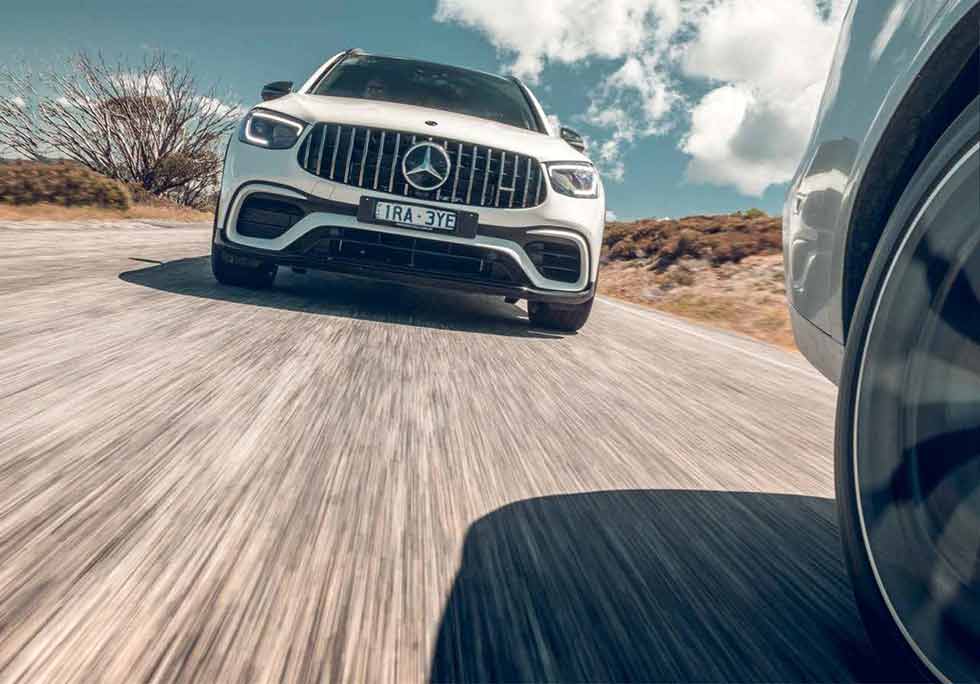
Arriving at some sort of decision on a finishing order is also creating a mental roadblock. The Mercedes-AMG GLC 63 S does exactly what buyers in this category want. It’s a loveable brute of a thing and it’s an easy and safe recommendation. Would you get bored once you had exhausted its somewhat one-dimensional personality? Maybe. But you’d have a whale of a time arriving at that conclusion.
The Velar might not be quite as quick, but it feels even glitzier inside, and there’s something beguiling about a vehicle this fast that can also clamber up Falls Creek’s steepest ski runs, 21-inch alloys notwithstanding. With the most space inside and the best ride, it would be the easiest to live with day in, day out. There’s also a wry irony about the car that appears to be the most design-led also being the most ruggedly practical.
Which leaves the quickest, most agile, most rewarding and most economical vehicle here. The BMW X4 M Competition isn’t an easy car to initially bond with, but perseverance pays dividends. There are layers to its personality that only time, tenacity and testing reveal. It’s an intriguing and, yes, subtle thing, with genuine appeal as a driver’s car, but the fact remains that in this company it feels relatively ordinary inside. In other words, you’re being asked to invest in a quality – its keenly focused dynamics – that most customers won’t put a premium on. Subtlety doesn’t sell super-SUVs, but on a cold mountain road in autumn it gets a warm reception from us.
So how do you decide on which of these is the best? If it’s a case of best answering customer needs, it’s the Mercedes. Should you prefer more space, comfort and off-road ability, go Velar. For a purer corner-carving experience, the X4 M Competition shines. Each has its own sub-niche, but on this occasion we can’t argue with the popular vote. It’s the three-pointed star by the merest sliver.
SITTING BACK
Tail gunner
The only one that feels compromised in the back is the BMW, the hard-shell front seats not being particularly kind to the old patellas. The Mercedes is better for both leg- and headroom, with a set of rather noisy but effective air vents. The Velar takes the crown. Not only is there plenty of toe-room under the front seats, but there’s ample headroom for 185cm Kirby (pictured) as well as individual settings for rear seat heaters and climate control functions. Longest wheelbase wins.
Touch and go
Best infotainment system? For response and intuitiveness, it’s BMW’s slightly ageing iDrive 6. Mercedes’ MBUX is excellent but takes time to learn. The touchpad is also a retrograde step. The lovely Burmester audio isn’t though. TouchPro Duo in the Velar is certainly comprehensive, but requires a lot of attention, often benefiting a co-driver. It also flaked on us intermittently during the test.
Summer at 1842m feels more like the winter of our discount tents
X4 M Comp
- CLOCKING OFF
The dial design is from a prior BMW generation, with chrome bezels in an otherwise digital dash. It’s a little dated but far more legible than Munich’s newest design theme.
- BEAST MODE
No matter which drive mode is previously selected, the X4 M reverts to granny config at startup. Yet, strangely, it retains the setting if you set the exhaust to maximum angry.
- NOT OF THIS GIRTH
Chubby steering wheel isn’t the last word in finesse. The M1 and M2 tabs are clever, but the result is that changing into a sharper drive mode is often easier than reverting back.
GLC 63 S
- CAN’T TOUCH THIS?
Yet to be convinced that Merc’s touchpad is an improvement on the old rotary controller. There’s no haptic feedback from it; as a result, your eyes often come off the road.
- WHEEL GENIUS
Love the AMG wheel. Not too big, unapologetically glitzy and tactile, with leather, Alcantara and licks of brightwork. It’s a delight. It even has functionally useful touchpads.
- DEPTH CHARGE
There is a wireless charging pad, but it’s buried so far into the bowels of the dash that you’ll frequently leave your phone behind. Unlike the BMW, there’s no warning chime.
Velar SVA
- HOT SEAT
Velar has some spectacular front chairs. Snug, beautifully finished and supportive, they also heat, cool and massage. The steering wheel is also heated.
- GLASS COCKPIT
Every piece of glass in the Velar is athermic. That means great thermal insulation for you. It also means we had to do the performance test with the sunroof open to get a GPS signal.
- DIALLED OUT
Rotary gearshifter looks and feels cheap and is a design tic that’s probably run its course. It’s still better than the antediluvian stalk-mounted shifter in the Merc though.
BMW’s cabin is ageing but its cornering ability doesn’t get old. Can’t really say the same of those Velar exhausts.
Noise Abatement Orders are now available on special.
CONSUMER TIP: BUY THE CHEAP ONE
MERCEDES-AMG GLC 63 S
Price $164,600/Tested $166,000*
Drivetrain
Engine V8, dohc, 32v, twin-turbo
Layout front engine (north-south), AWD
Capacity 3982cc
Max Power 375kW @ 5500-6250rpm
Max Torque 700Nm @ 1750-4500rpm
Trans. 9-speed automatic
Chassis
Body steel, 5 doors, 5 seats
L/W/H/WB 4655/1890/1644/2873mm
Track (F/R) 1620/1621mm
Weight 2095kg
Boot 550 litres
Fuel/tank 98 octane/66 litres
Economy 11.1L/100km (test average)
Suspension Front: multi-link, air springs, anti-roll bar
Rear: multi-link, air springs, anti-roll bar
Steering electric rack-and-pinion
Turn circle 11.8m (2.0 turns lock-to-lock)
Front brakes ventilated discs (390mm)
Rear brakes ventilated discs (390mm)
Tyres Continental CrossContact UHP
Tyre size 265/40 R21 105Y (f)
295/35 ZR21 107Y (r)
Safety
ANCAP rating ***** (Aus)
Performance
Power-to-weight: 179kW per tonne
Redline/cut-out: 7000/6800rpm
Speed at indicated 100km/h: 96
Standing-start acceleration
0-20km/h: 0.6sec
0-40km/h: 1.1sec
0-60km/h: 1.8sec
0-80km/h: 2.7sec
0-100km/h: 3.8sec
0-120km/h: 5.2sec
0-140km/h: 6.9sec
0-160km/h: 8.9sec
0-180km/h: 11.4sec
0-200km/h: 14.7sec
0-400m: 12.1sec @ 184km/h
Rolling acceleration
80-120km/h: 2.5sec
Braking distance
100km/h-0: 39.0m
Verdict 8.5/10
Track: Heathcote Raceway, dry. Temp: 17.5ºC.
Driver: Andy Enright. Warranty: 5yr/unlimited km.
Service interval: 12 months/10,000km. Glass’s
3-year resale: 61%. AAMI Insurance: $2720.
* Premium paint ($1400)
BMW X4 M COMPETITION
Price $164,900/Tested $169,200*
Drivetrain
Engine in-line 6cyl, dohc, 24v, twin-turbo
Layout front engine (north-south), AWD
Capacity 2993cc
Max Power 375kW @ 62500rpm
Max Torque 600Nm @ 2600-5950rpm
Transmission 8-speed automatic ZF 8HP
Chassis
Body steel, 5 doors, 5 seats
L/W/H/WB 4758/1927/1620/2864mm
Track (F/R) 1617/1632mm
Weight 2045kg
Boot 525 litres
Fuel/tank 98 octane/65 litres
Economy 10.1L/100km (test average)
Suspension
Front: coil springs, adaptive dampers, anti-roll bar
Rear: multi-link, coil springs, adaptive dampers, anti-roll bar
Steering electric rack-and-pinion
Turn circle 12.6m (2.2 turns lock-to-lock)
Front Brakes ventilated discs (395mm)
Rear Brakes ventilated discs (370mm)
Tyres Continental SportContact 6
Tyre size front 255/40 ZR21 102Y (f)
Tyre size rear 265/40 ZR21 105Y (r)
ANCAP rating ***** (Aus)
Performance
Power-to-weight: 183kW per tonne
Redline/cut-out: 7200/7200rpm
Speed at indicated 100km/h: 98
Standing-start acceleration
0-20km/h: 0.6sec
0-40km/h: 1.2sec
0-60km/h: 2.0sec
0-80km/h: 2.7sec
0-100km/h: 3.7sec
0-120km/h: 5.0sec
0-140km/h: 6.5sec
0-160km/h: 8.3sec
0-180km/h: 10.5sec
0-200km/h: 13.6sec
0-400m: 11.9sec @ 189.1km/h
Rolling acceleration
80-120km/h: 2.3sec
Braking distance
100km/h-0: 35.2m
Verdict 8.5/10
Track: Heathcote Raceway, dry, cloudy. Temp: 19.5ºC. Driver: Andy Enright. Warranty: 3yr/ unlimited km. Service interval: condition-based.
Glass’s 3-year resale: N/A. AAMI Insurance: $2645.
Front and rear seat heating ($700), active seat ventilation ($1600), premium paint ($2000)
RANGE ROVER VELAR SVA
Price $176,412/Tested $181,325*
Drivetrain
Engine V8, dohc, 32v, supercharger
Layout front engine (north-south), AWD
Capacity 5000cc
Max Power 405kW @ 6000-6500rpm
Max Torque 680Nm @ 2500-5500pm
Transmission 8-speed automatic ZF 8HP
Body steel, 5 doors, 5 seats
L/W/H/WB 4806/2032/1676/2874mm
Track (F/R) 1644/1663mm
Weight 2235kg
Boot 558 litres
Fuel/tank 98 octane/60 litres
Economy 10.9L/100km (test average)
Suspension
Front: double A-arms, air springs, anti-roll bar
Rear: double A-arms, air springs, anti-roll bar
Steering electric rack-and-pinion
Turn circle 12.0m (2.6 turns lock-to-lock)
Front brakes ventilated discs (395mm)
Rear brakes ventilated discs (396mm)
Tyres Pirelli Scorpion Zero M+S
Tyre size 265/45R21 108Y
Safety
ANCAP rating ***** (Aus)
Performance
Power-to-weight: 181kW per tonne
Redline/cut-out: 6800/6750rpm
Speed at indicated 100km/h: 96
Standing-start acceleration
0-20km/h: 0.8sec
0-40km/h: 1.5sec
0-60km/h: 2.3sec
0-80km/h: 3.3sec
0-100km/h: 4.5sec
0-120km/h: 5.9sec
0-140km/h: 7.5sec
0-160km/h: 9.5sec
0-180km/h: 12.2sec
0-200km/h: 15.6sec
0-400m: 12.3sec @ 182.1km/h
Rolling acceleration
80-120km/h: 2.6sec
Braking distance
100km/h-0: 38.7m
Verdict 8.0/10
Track: Heathcote Raceway, dry. Temp: 20ºC. Driver:
Andy Enright. Warranty: 3yr/100,000km. Service interval: 12 months/10,000km. Glass’s 3-year resale: 61%. AAMI Insurance: $N/A.
* Driver assist pack ($2223), ambient lighting ($540), privacy glass ($890), black veneer ($530),
Terrain Response 2 with Dynamic program ($430), rear seat remote release levers ($300)





